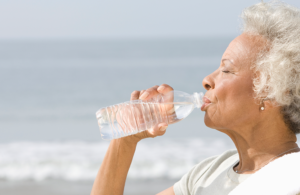Water is a critical substance to survival. In fact, it is considered an essential component of nearly every single bodily function. Seniors have a high risk of experiencing dehydration. In fact, the elderly have a higher risk of dehydration than any other age group. While there are various reasons for this, the main one is that – as we age – we experience a diminished sense, in terms of thirst. Staying hydrated is one of the most productive measures for maintaining optimal health.
 Why Are Seniors More Vulnerable to Dehydration?
Why Are Seniors More Vulnerable to Dehydration?
There are several ways to increase hydration among the elderly. Before delving into those strategies, it is important to first expound on why seniors are more vulnerable to dehydration:
- As mentioned previously – as we age – we experience a diminished sense of being thirsty. The body may be craving or may be in need of fluids, but an older adult may not be aware of that fact. It has been determined that by the time an older adult experiences thirst, the body may already be dehydrated.
- As a person grows older, changes are experienced in the body composition. These changes often result in an older person’s body having less water within their bodies than younger individuals.
- By the time a person becomes a senior, it is likely that they are taking prescription medications. Many of these medications are known to increase the risk of dehydration occurring.
- The body of an older adult is no longer capable of regulating temperature like the body of a younger individual. As a result of this fact, exercise and activities may cause sweating. In turn, as the individual perspires, they lose fluid from the body fast.
- Finally, many seniors have issues remembering when they drank. In some instances, they may experience thirst but may be unable to get a drink on their own or become distracted from obtaining a drink. This is common in those who have memory loss due to stroke, underlying medical conditions, and/or a form of dementia.
Staying Hydrated
Each day, an older adult should drink one-third of their body weight in ounces. For example, if a senior weighs 120 pounds, they should drink 40 ounces of water daily. This is just a general rule of thumb. Factors such as underlying medical conditions, prescription medications, and medical history should also be considered when determining how much water should be consumed.
Symptoms of Dehydration
In older adults, even the mildest case of dehydration may produce symptoms. The following outline the most common:
- Fatigue
- Weakness
- Confusion
- Decreased Cognitive Functioning
- Coordination Problems
- Irritability
- Headache
- Dizziness
- Dry Mouth
- Muscle Cramps
- Falling
Medical Assistance
If you notice any signs of dehydration in a senior adult, it is advised that you seek medical assistance immediately. Depending on the sign – like dry mouth – you may be able to resolve the issue on your own; however, dehydration sets in quickly in seniors and may lead to numerous complications.
To learn more about aging populations, caring for seniors, and other relevant topics, we here at Beacon Senior Advisors encourage you to visit our blog at: https://beaconsenioradvisors.com/blog/